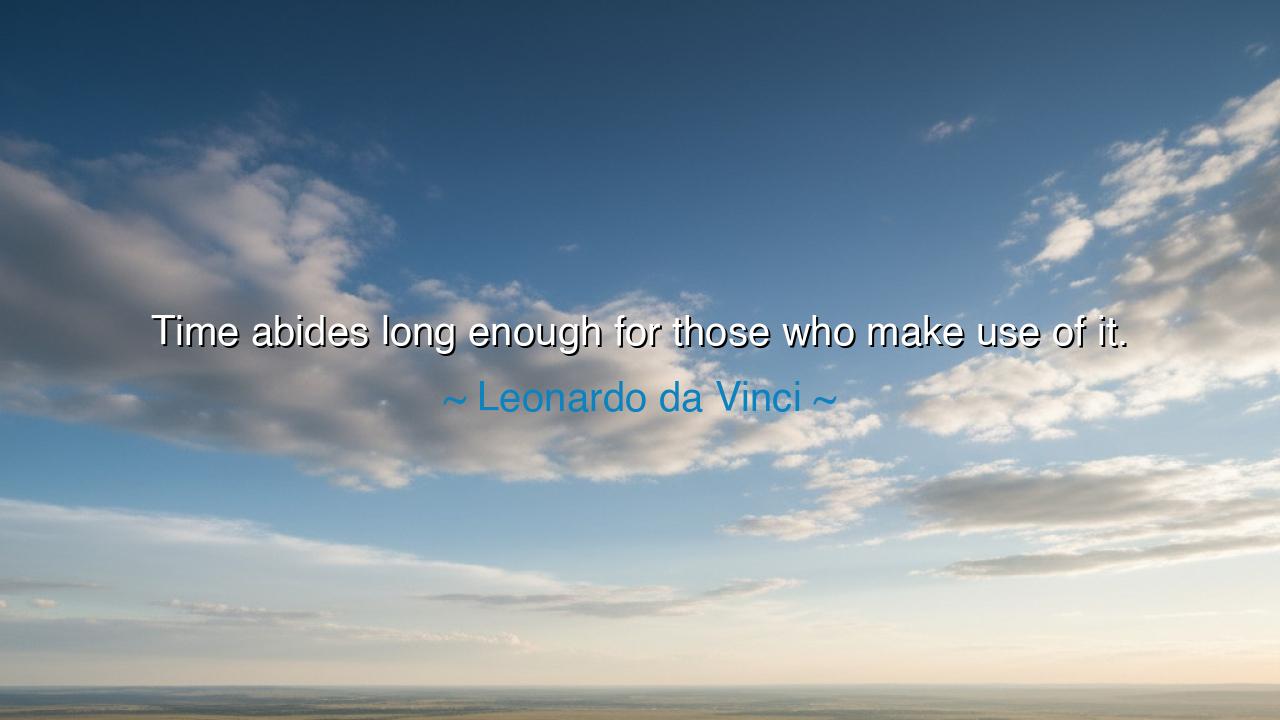
Time abides long enough for those who make use of it.






The universal genius of the Renaissance, Leonardo da Vinci, gave the world a truth as radiant as his art and as precise as his inventions when he said: “Time abides long enough for those who make use of it.” In this simple declaration, he revealed the secret of mastery: that it is not the length of days that matters, but the depth with which they are lived. To the idle, time is fleeting, slipping through their hands like water. But to the purposeful, time stretches, expands, and yields enough to create wonders that endure beyond centuries.
The origin of this saying can be traced to Leonardo’s own life, a life crowded with projects, studies, and passions. Though he often began works he never finished, his use of time was never wasted. He filled his hours with drawings, dissections, experiments, and visions of flying machines. His notebooks teem with sketches and observations that prove his mind was always at work. To him, time was not an enemy but a field of opportunity. Even within the brief span of a human life, there was room enough to discover, to create, and to leave behind legacies that would outlast empires.
The ancients understood this wisdom as well. Seneca, the Roman Stoic, taught that life is long enough if it is rightly used. It is not years that grant fulfillment, but discipline and intention. A single day lived with clarity is worth more than decades squandered in distraction. Leonardo’s words echo this Stoic conviction: time serves those who serve it. The idle complain of its brevity, while the diligent discover its abundance.
History gives us shining examples. Consider Alexander the Great, who died at thirty-two yet conquered lands stretching from Greece to India. His years were few, yet he used them with such intensity that his name still resounds through the ages. Or think of Florence Nightingale, who in the brief span of her prime transformed the practice of nursing, saving countless lives. These lives demonstrate Leonardo’s principle: time abides long enough for those who act with purpose.
The meaning of this teaching is both empowering and humbling. Empowering, because it tells us that we need not live a thousand years to achieve greatness—only to use the years we are given wisely. Humbling, because it removes excuses. To say “I had no time” is to confess not the shortage of hours, but the poverty of our use of them. The same sun that shone on Leonardo shines upon us. The same hours that he filled with genius are offered to each of us daily.
Therefore, the lesson is this: treat each hour as sacred. Do not waste it in endless delay, nor bury it in trivial pursuits. Ask yourself: “Am I using time, or is time using me?” Live with intention, and you will find that even short spans are enough to plant seeds that grow into forests. Delay, and even a lifetime may feel empty. Time is generous to the purposeful, but merciless to the idle.
In practice, I counsel this: set your priorities like a craftsman sets his tools. Begin each day with one task that aligns with your higher calling. Do not chase every distraction, but bend your energy toward what endures—love, learning, service, creation. Keep a record of your days, so that you may measure whether you are using them well. And remember that rest itself, when chosen wisely, is not waste but renewal, sharpening you for greater purpose.
Thus, hear the eternal wisdom of Leonardo da Vinci: “Time abides long enough for those who make use of it.” Do not lament the brevity of life, but honor the gift of hours given. For to those who act with clarity, time is always sufficient. And though your days may pass like all mortals, the works of your hands and the legacy of your spirit may abide long after time itself has moved on.






AAdministratorAdministrator
Welcome, honored guests. Please leave a comment, we will respond soon